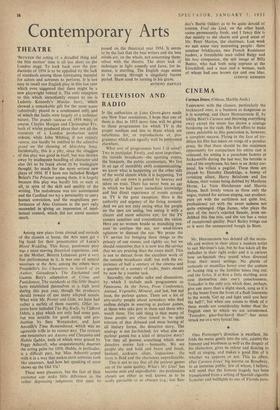Contemporary Arts
THEATRE
`BETWEEN the acting of a dreadful thing and the first motion' time is all too short on the London stage. To look back over the pro- ductions of 1954 is to be appalled by the lack of standards among those fabricating material for actors and actresses to perform. It is not easy to recall one English play in this last year which even suggested that there might he a new playwright behind it. The only exception to this which immediately occurs to me is Ludovic Kennedy's Murder Story, which showed a remarkable gift for the tense scene (admittedly placed in a condemned cell), and of which the faults were largely of a technical nature. The grands vaincus of 1954 were, of course, Charles Morgan and Cbristopher Fry, both of wham produced plays that not all the resources of a London production could redeem, while John' Whiting, if not entirely vaincu, can hardly be entitled to the adjective grand on the showing of Marching Song. Incidentally, this is a pity, since the situation of this play was good in itself, but was thrown away by inadequate handling of character and also (let us be frank about it) by inadequate thought. So much for the more serious new plays of 1954. If I have not included Bridget Bolan's The Prisoner among them, it is largely because this play was hardly felt as such at all, in spite of the skill and quality of the writing. The melodrama was too accentuated and the Cardinal too icy a personality to carry human conviction, and the magnificent per- formance of Alec Guinness in the part only succeeded in 'giving an impression of intel- lectual control, which did not mend matters much.
Among new plays from abroad and revivals of the classics at home, the Arts must get a big hand for their presentation of Lorca's Blood Wedding. This fierce, passionate play was a most moving theatrical experience, and, as the Mother, Beatrix Lehmann gave a very fine performance in it.. It was one of several successes at the Arts; among the others were Pirandello's Six. Characters in Search of an Author, Giraudoux's The Enchanted and Gaston Baty's adaptation of Crime and Punishment. The standards at this little theatre have established themselves at a high level during this past year, though the producers should beware of too many adapted novels. What with Mr. Pooter and Gide, we have had rather a surfeit of them recently. Other im- ports have included The Big Knife, by Clifford Odets, a play which not only had some guts, but was notable for good acting and pro- duction by Sam Wanamaker, and Jean Anouilh's TiMe Remembered, which was an agreeable trifle in its rococo way. The revivals one remembers are Antony and Cleopatra and Hedda gaoler, both of which were graced by Peggy Ashcroft, who unquestionably deserves
the acting palm for 1954. Hedda, in particular, is a difficult part, but Miss Ashcroft coped with it in a way that makes most actresses took like amateurs. And how her speaking of verse shows up the Old Viel •
These were pleasures, but the fact of their existence can make little difference to the rather depressing judgement that must be passed on the theatrical year 1954. It seems to be the fact that the best writers and the best minds are, on the whole, not concerning them- selves with the theatre, The sheer lack of technique in light comedy and farce, for in- stance, is startling. The English stage seems to be passing through a singularly barren period, Shaw must be turning in his grave.
ANTHONY HARTLEY














































 Previous page
Previous page